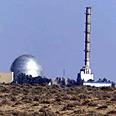
'S. African official bought nuclear trigger from Israel in 70s'
Johannesburg paper fans claims of alleged nuclear ties between Jerusalem, Pretoria, saying Apartheid-era minister transported atom trigger from Tel Aviv to South Africa in mid-1970s; says information was withheld for fear for minister's safety
Nuclear ties exposed? A Johannesburg newspaper reported Thursday that a South African Apartheid-era minister bought a "nuclear trigger" from Israel in the 1970s and carried it back to South Africa in hand luggage.
The purchase was allegedly made as part of Pretoria's mid-70s attempts to develop nuclear weapons.
The British Guardian said that two renowned South African journalists allege that Eschel Rhoodie, who served as the apartheid government's information minister and played a central role in forming his country's military ties with Israel, privately described in 1979 how he had transported "the trigger" as hand luggage on a flight from Tel Aviv.
The two said they were unable to publish the account at the time because of censorship and the former minister's concerns for his safety.
Secret nuclear ties
Allister Sparks, former editor of Rand Daily Mail, said he decided to go public with Rhoodie's admission, following a Guardian report about a new book which suggested that Israel offered to sell nuclear warheads to apartheid South Africa.
Sparks said Rhoodie travelled regularly to Israel in the mid-70s, and on occasions was accompanied by South Africa's then-Intelligence Chief Hendrik van den Bergh.
"Rhoodie said talks had taken place between the two sides which had ultimately led to he and Van den Bergh being assigned the task of bringing "the trigger" to SA – which he said they did by packing it in a tea chest and transporting it as part of their hand-luggage on a South African Airways commercial flight," Sparks said.
Rhoodie later revealed the information to then-Rand Daily Mail's chief investigative reporter, Mervyn Rees.
Rees confirmed Sparks's account to the Guardian, adding that Rhoodie did not give full details about the "trigger".
"I questioned him about it and he said I can't give you any of the details but suffice to say it was a vital component, it was a trigger, that would be used for South Africa's nuclear capability," said Rees.
Tritium in hand luggage
It is possible that what Rhoodie called a trigger was tritium, a radioactive isotope required in detonators of certain types of atom bombs. It has been revealed, though never officially confirmed, that Israel supplied South Africa with 30g of tritium in late 1970 - enough to build a dozen atom bombs.
Apartheid-era officials have denied the tritium was used as part of the country's nuclear weapons program, and have pointed out that ultimately South Africa developed a type of atomic bomb that did not require that particular radioactive isotope.
Nevertheless, Sparks and Rees noted that Rhoodie clearly said that what he called "the trigger" was delivered from Israel as part of South Africa's development of a nuclear weapon, providing some evidence that the two were cooperating on the issue.
Rhoodie, who died in 1993, apparently told Rees that he became a point-man in South Africa's dealing with Israel, following holiday he spent in Israel. He later met then- Defense minister Shimon Peres, is what he said was "an important step in establishing what would become very close collaboration in developing weapons."
'Ex-minister a reliable source'
Rees said he found Rhoodie's version of events reliable, because he proved to have given reliable accounts on other secret operations, adding the former minister agreed to talk to the Rand Daily Mail on the condition he could withhold publication of information he ultimately decided against disclosing – a condition he later applied to the revelations about the nuclear cooperation.
Sparks said that the censorship laws of the time would have prevented him from printing the story, but since Rhoodie was no longer alive, and fresh revelations about South Africa's nuclear ties to Israel had surfaced, "the time had come to reveal the truth.
"We do so because we believe it is now clear that there was nuclear collaboration between Israel and South Africa that enabled both sides to develop the bomb – and that given the state of nuclear proliferation in the world today it is in the global public interest that all available information about shady dealings with these apocalyptic weapons be brought into the open," Sparks wrote.
Commenting on the report, President Shimon Peres' spokesperson, Ayalet Frisch, pointed to a statement by the former South African president F.W. de Klerk that his country had not cooperated with any foreign government in developing its nuclear weapons.
De Klerk made a similar claim to the South African parliament in 1993, saying that the country never acquired nuclear weapons technology or materials from another state nor did it cooperate with foreign governments in developing its atomic bombs.
Nevertheless, the statement has since been challenged by revelations about the amount of yellowcake uranium South Africa supplied to Israel, the tritium deliveries and the joint development and testing in South Africa of missiles to carry nuclear weapons.










